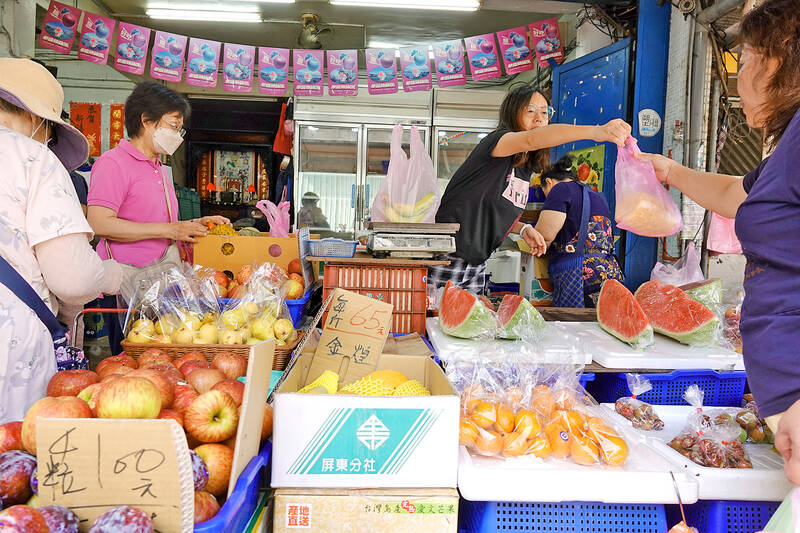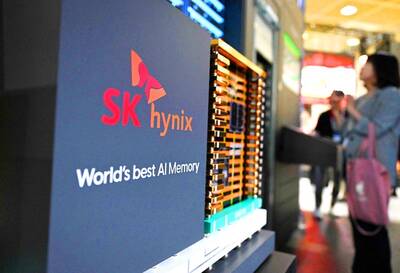The consumer price index (CPI) last month eased to 1.95 percent, below the central bank’s 2 percent target, as food and entertainment cost increases decelerated, helped by stable egg prices, the Directorate-General of Budget, Accounting and Statistics (DGBAS) said yesterday.
The slowdown bucked predictions by policymakers and academics that inflationary pressures would build up following double-digit electricity rate hikes on April 1.
“The latest CPI data came after the cost of eating out and rent grew moderately amid mixed international raw material prices,” DGBAS official Tsao Chih-hung (曹志弘) told a news conference in Taipei.

Photo: CNA
The central bank in March raised interest rates by 0.125 percentage points in what board members called a pre-emptive and appropriate attempt to curb inflation expectations that could run wild following the across-the-board electricity rate adjustments.
That did not happen, despite shelter costs rising 2.07 percent on the back of a 4.48 percent increase in electricity rates and a 2.34 percent gain in rents, the agency’s monthly survey found.
The electricity rate hikes did not prompt businesses to follow suit. Rather, a “revenge consumption” trend has mitigated, nearly two years after the lifting of COVID-19 restrictions.
Electricity rates would rise again in the summer from June to September, Tsao said.
Education and entertainment prices rose 1.58 percent, the smallest increase among major consumption categories, although demand for cross-border travel remained robust, he said, adding that after-school tutor fees rose 3.64 percent.
Food costs, the largest category by weighting, climbed 2.58 percent, as fruit and vegetable prices, and the cost of dining out rose 4.28 percent, 2.19 percent and 2.93 percent respectively, he said.
However, prices for 17 frequently purchased items declined for the first time in four years, while an unfavorable comparison base effect linked to soaring egg prices last year faded, he said.
Healthcare costs and medical product prices outpaced other consumption categories with a 3.52 percent rise after medical facilities raised registration fees, as well as drug and copayment charges, the survey showed.
Core CPI, a more reliable long-term price tracker because it excludes volatile items, posted a more benign 1.81 percent increase, the official said, affirming stable consumer prices.
The producer price index (PPI), which measures price movements from a seller’s perspective, accelerated 2.06 percent year-on-year, from a revised 0.49 percent gain in March, as international fuel and gasoline prices became more expensive and a weaker local currency made the price differences more apparent, DGBAS said, adding that cheaper poultry and base metal products helped soften the growth.
In the first four months, the CPI advanced 2.24 percent, while the PPI rose at a milder pace of 2.12 percent.

Intel Corp chief executive officer Lip-Bu Tan (陳立武) is expected to meet with Taiwanese suppliers next month in conjunction with the opening of the Computex Taipei trade show, supply chain sources said on Monday. The visit, the first for Tan to Taiwan since assuming his new post last month, would be aimed at enhancing Intel’s ties with suppliers in Taiwan as he attempts to help turn around the struggling US chipmaker, the sources said. Tan is to hold a banquet to celebrate Intel’s 40-year presence in Taiwan before Computex opens on May 20 and invite dozens of Taiwanese suppliers to exchange views

Application-specific integrated circuit designer Faraday Technology Corp (智原) yesterday said that although revenue this quarter would decline 30 percent from last quarter, it retained its full-year forecast of revenue growth of 100 percent. The company attributed the quarterly drop to a slowdown in customers’ production of chips using Faraday’s advanced packaging technology. The company is still confident about its revenue growth this year, given its strong “design-win” — or the projects it won to help customers design their chips, Faraday president Steve Wang (王國雍) told an online earnings conference. “The design-win this year is better than we expected. We believe we will win

Power supply and electronic components maker Delta Electronics Inc (台達電) yesterday said it plans to ship its new 1 megawatt charging systems for electric trucks and buses in the first half of next year at the earliest. The new charging piles, which deliver up to 1 megawatt of charging power, are designed for heavy-duty electric vehicles, and support a maximum current of 1,500 amperes and output of 1,250 volts, Delta said in a news release. “If everything goes smoothly, we could begin shipping those new charging systems as early as in the first half of next year,” a company official said. The new

SK Hynix Inc warned of increased volatility in the second half of this year despite resilient demand for artificial intelligence (AI) memory chips from big tech providers, reflecting the uncertainty surrounding US tariffs. The company reported a better-than-projected 158 percent jump in March-quarter operating income, propelled in part by stockpiling ahead of US President Donald Trump’s tariffs. SK Hynix stuck with a forecast for a doubling in demand for the high-bandwidth memory (HBM) essential to Nvidia Corp’s AI accelerators, which in turn drive giant data centers built by the likes of Microsoft Corp and Amazon.com Inc. That SK Hynix is maintaining its